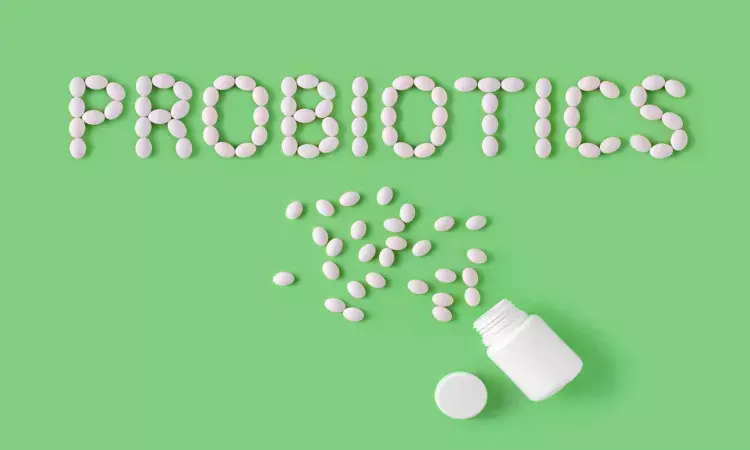- Home
- Medical news & Guidelines
- Anesthesiology
- Cardiology and CTVS
- Critical Care
- Dentistry
- Dermatology
- Diabetes and Endocrinology
- ENT
- Gastroenterology
- Medicine
- Nephrology
- Neurology
- Obstretics-Gynaecology
- Oncology
- Ophthalmology
- Orthopaedics
- Pediatrics-Neonatology
- Psychiatry
- Pulmonology
- Radiology
- Surgery
- Urology
- Laboratory Medicine
- Diet
- Nursing
- Paramedical
- Physiotherapy
- Health news
- Fact Check
- Bone Health Fact Check
- Brain Health Fact Check
- Cancer Related Fact Check
- Child Care Fact Check
- Dental and oral health fact check
- Diabetes and metabolic health fact check
- Diet and Nutrition Fact Check
- Eye and ENT Care Fact Check
- Fitness fact check
- Gut health fact check
- Heart health fact check
- Kidney health fact check
- Medical education fact check
- Men's health fact check
- Respiratory fact check
- Skin and hair care fact check
- Vaccine and Immunization fact check
- Women's health fact check
- AYUSH
- State News
- Andaman and Nicobar Islands
- Andhra Pradesh
- Arunachal Pradesh
- Assam
- Bihar
- Chandigarh
- Chattisgarh
- Dadra and Nagar Haveli
- Daman and Diu
- Delhi
- Goa
- Gujarat
- Haryana
- Himachal Pradesh
- Jammu & Kashmir
- Jharkhand
- Karnataka
- Kerala
- Ladakh
- Lakshadweep
- Madhya Pradesh
- Maharashtra
- Manipur
- Meghalaya
- Mizoram
- Nagaland
- Odisha
- Puducherry
- Punjab
- Rajasthan
- Sikkim
- Tamil Nadu
- Telangana
- Tripura
- Uttar Pradesh
- Uttrakhand
- West Bengal
- Medical Education
- Industry
Probiotics formulations may be used as complementary treatment for depressive disorders, claims study

A recent study highlighted the potential of probiotics as a supplementary treatment for depression, while also uncovering the impact of metabolic factors on their effectiveness. The key findings of this study were published in the recent edition of Nutrients Journal.
This research included a total of 116 participants who were diagnosed with depression. These individuals were randomly assigned to receive either a probiotic preparation containing Lactobacillus helveticus Rosell®-52 and Bifidobacterium longum Rosell®-175 or a placebo over a span of 60 days. The study utilized a parallel-group, prospective, randomized, double-blind, controlled design to ensure the reliability of the findings.
Throughout the intervention period, the psychometric data of the participants were assessed at five different time points. Also, various metabolic parameters such as blood pressure, body weight, waist circumference and serum levels of C-reactive protein, cholesterol, triglycerides and fasting glucose were measured at the outset of the study.
While the overall depression scores did not show a significant advantage for the probiotics group over the placebo group, this study revealed a marked trend. The participants supplemented with probiotics expressed a higher rate of minimum clinically important differences when compared to the participants on placebo which indicated potential benefits. This effect was particularly pronounced in the subgroup of participants who also received antidepressant treatment.
The study also brought to light a crucial factor that influenced the efficacy of probiotics in treating depression which was metabolic abnormalities. The research found that individuals with more advanced metabolic issues, such as overweight, excess central adipose tissue and liver steatosis underwent lower improvements in psychometric scores. Also, the individuals with higher baseline stress levels showed better improvements by suggesting a complex interplay of factors at play.
The study illuminated that while probiotics show promise as complementary treatments for depressive disorders, they may not suffice as standalone interventions. The findings highlight the need for a precise approach to depression treatment in cases where metabolic abnormalities are present.
This study marks a crucial step forward in improving the existing understanding of the potential role of probiotics in mental health. Further research with in depth focus into the intricate connections between gut health, metabolism and depression are imperative as new avenues for more effective treatment strategies may emerge to offer better management of this debilitating condition.
Source:
Gawlik-Kotelnicka, O., Margulska, A., Płeska, K., Skowrońska, A., & Strzelecki, D. (2024). Metabolic Status Influences Probiotic Efficacy for Depression—PRO-DEMET Randomized Clinical Trial Results. In Nutrients (Vol. 16, Issue 9, p. 1389). MDPI AG. https://doi.org/10.3390/nu16091389
Neuroscience Masters graduate
Jacinthlyn Sylvia, a Neuroscience Master's graduate from Chennai has worked extensively in deciphering the neurobiology of cognition and motor control in aging. She also has spread-out exposure to Neurosurgery from her Bachelor’s. She is currently involved in active Neuro-Oncology research. She is an upcoming neuroscientist with a fiery passion for writing. Her news cover at Medical Dialogues feature recent discoveries and updates from the healthcare and biomedical research fields. She can be reached at editorial@medicaldialogues.in
Dr Kamal Kant Kohli-MBBS, DTCD- a chest specialist with more than 30 years of practice and a flair for writing clinical articles, Dr Kamal Kant Kohli joined Medical Dialogues as a Chief Editor of Medical News. Besides writing articles, as an editor, he proofreads and verifies all the medical content published on Medical Dialogues including those coming from journals, studies,medical conferences,guidelines etc. Email: drkohli@medicaldialogues.in. Contact no. 011-43720751


